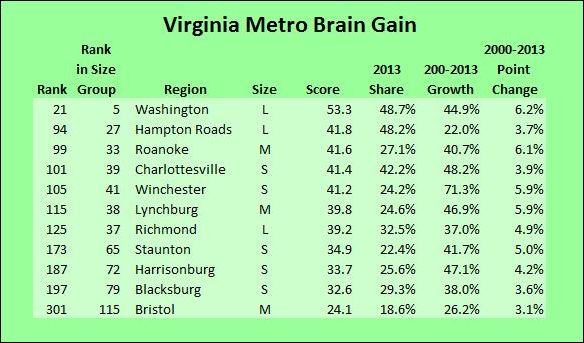Joel Kotkin and Mark Schill at the New Geography blog have devised a different way of looking at which metro regions are winning and which ones are falling behind in the competition to build an educated workforce. By this set of metrics, most Virginia regions score in the top 50% of the nation’s 380 metropolitan regions, but none are standouts. Overall, our regions are doing OK, better than average, but no one is setting the world on fire.
What does this chart, extracted from ranking of all 380 regions, measure? I’ll let Kotkin and Schill explain:
To determine the metro areas that are gaining brainpower in the 21stCentury, we scored the nation’s 380 metropolitan statistical areas based on three criteria. We started with the growth rate in the number of residents with at least a bachelor’s degree from 2000 through 2013 (25% weighting in final score). But since the places that post the highest growth rates tend to be those starting with low levels of educational attainment, we gave greater weight to the percentage point increase in the share of the population that is college-educated over that span (50%), and we factored in the share of educated people in the population in 2013 (25%). We also separated out results for the 51 MSAs with over a million residents.
Not surprisingly, metro regions with a large college/university presence tended to do better over the 13-year period studied, but industry mix played an important role as well. Government and high-tech industries attracted educated workers. The Washington metro has the best educated population in the country.
After following the debate for more than a decade now, I have to say, it’s still not clear to me what, if anything, metro regions can do to recruit and retain educated workers. Employers are the driving force — they are the ones who recruit employees to a region. Regions with industries that are profitable, growing and pay well enjoy a big advantage over regions dominated by shrinking, low-paying industries. But there’s more to the story than that. Regions also have to hold on to their employees. If costs are too high, if life is boring, if the community isn’t welcoming to outsiders, talented young people will leave.
There are no quick fixes here. It can take literally generations of effort to build an employment base of dynamic employers with the clout to recruit talented workers and to create the kinds of amenities that keep those talented workers in town. Regions that view the challenge clearly and sustain their efforts over the years will prevail over those that don’t.
— JAB



